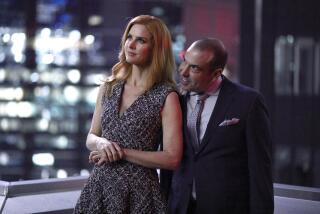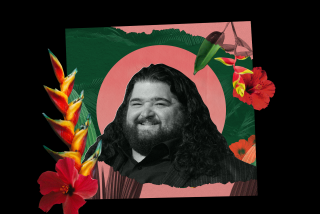‘Lost’ takes an odd path to diversity
- Share via
When J.J. Abrams turned in an outline for “Lost” last year, Lloyd Braun, then ABC Television Group’s chairman, bragged excitedly to a buddy, “This, my friend, is ‘ER.’ ”
Braun was so convinced by the 25-page outline in his hands, a hybrid of “Survivor” and “Cast Away,” that he ordered a two-hour, $11-million pilot with no script, just the creators’ vision of plane crash survivors on an eerie, not-so-deserted island.
“The outline was, quite honestly, the best piece of television I’ve ever read,” said Braun, who had conceived the show and is now the head of Yahoo Media Group. “I was out of my mind.”
Then came the reality check: The two-hour pilot, featuring an ensemble of 14 actors, would have to be finished in 12 weeks -- at the end of pilot season, when supposedly all of the hot talent had been scooped up. Which meant that co-creators Abrams (“Alias” and “Felicity”) and Damon Lindelof, a writer-producer on “Crossing Jordan,” and casting director April Webster would have to pull off a casting feat for the history books.
What they came up with broke new TV ground, but not just for its warp-speed casting efficiency. They also -- somewhat inadvertently -- managed something with more profound implications: They assembled an ethnically and geographically diverse cast, then hammered out a show for them that favored humanity over tokenism -- a casting and writing coup that has sparked water-cooler chatter beyond the island’s frightening man-eating monster, polar bears and other spooky human inhabitants. With its unmatched pan-demographic cast of characters who all defy stereotypical expectations, the show reflects the world as it is increasingly experienced by young people, who are less racially identified than older generations. “Lost” moves a step beyond even “ER,” long considered the gold standard of diversity. In the Chicago emergency room, an institutional hierarchy to some degree dictates character development. On a remote island, anything goes.
*
Keeping an open mind
Openness was job requirement No. 1 for 25-year veteran Webster, who casts “Alias” and was hired by Abrams and Lindelof to find the would-be castaways. With no script -- the creators had not completed it -- and few audition scenes, Webster alerted agents in New York, Los Angeles, Europe, Canada and Australia, and left the rest up to the universe. The passengers of Oceanic Flight 815, which departed from Sydney, Australia, and was heading for L.A., were supposed to come from all over the globe.
Steve McPherson, who headed Touchstone Television, the studio that produces “Lost,” before it became his job as ABC’s head of prime-time programming to schedule the show, said time pressure may have helped Abrams and his team buck the usual casting patterns and create truly innovative TV characters. “It just shows you what you can do when you don’t try to control it too much,” Webster said. “These actors were so willing and able to not know. And in that way, they helped the writers create such interesting people.”
As a result of the speeded-up schedule and lack of clear script requirements, actors were cast for parts that didn’t exist and other characters were altered to fit the qualities of actors the producers wanted to hire. Even the role of Jack, the show’s doctor-hero, played by Matthew Fox, changed from a guest spot to a series regular when Abrams decided to let him live. Jack originally was going to be killed by the show’s unseen monster and left hanging on a tree, which then became the unfortunate fate of the airliner’s pilot.
“Because it was all so new and fluid, if they saw a great actor for another role, they’d create it right then and there,” Braun said.
Case in point: Yunjin Kim, who was born in Korea and grew up in New York City and auditioned for the part of Kate, the fugitive-murderer, who ended up being played by Evangeline Lilly, a Canadian actress. What Kim did not know is that Abrams and Lindelof had a vague idea for another character who does not speak English, and meeting Kim was the spark for two more characters.
“She had this incredible career in Korea,” Lindelof said. “One of her movies [“Shiri”] outgrossed ‘Titanic,’ and she was so talented, we really wanted her. So we thought, What if she’s Korean and we have a couple and they’re alienated from the rest of the group because they can’t communicate?”
She became a character named Sun, and a search began for Sun’s husband, Jin, who was scripted as a waiter before he married into a wealthy family and began working for his father-in-law’s highly questionable business. Enter Daniel Dae Kim, a Korean-born actor who grew up in New York and Philadelphia. Jin and Sun speak in Korean, and how the show handles it is a TV first: When they’re alone, their conversations are subtitled; when the other castaways are nearby, there are no translations.
“Nobody wants tokenism, and that’s one of the reasons I’m so proud of this show,” Daniel Dae Kim said. “It shows America and television executives and movie producers that you don’t have to have a lily-white cast of twentysomethings to have a successful project. The story lines speak to America regardless of color and can even be enhanced by mixtures of race and gender.” That same attitude transformed the character named Hurley in the minds of the creators from a 55-year-old redneck to the sweet and affable large guy who cracks jokes on the island. Jorge Garcia had guest-starred on “Curb Your Enthusiasm,” and the producers, taken with his comedic timing, requested that Webster track him down. All that is known about Hurley, so far, is that his real name is Hugo Reyes and he is a native Californian of Latino heritage.
“Whoever the characters were in their regular life gets thrown out the window because they’re forced to live together in that situation,” said Garcia, who grew up in San Juan Capistrano and is the son of a Cuban mother and Chilean father. “It doesn’t matter who any of them thought they were or who society thought they were.”
That may hold true in the South Seas, where the castaways are stranded, but Hollywood often misses an important point -- one that Michael Crichton effectively made when he wrote the pilot for “ER” without including gender or race for any of the doctors.
“If racial identity is the only thing that’s interesting about a character, that’s extremely limiting and also insulting to how society works now,” said John Wells, whose company produces “The West Wing,” “Third Watch,” “Jonny Zero” and “ER.” “Sometimes in an attempt to diversify shows, the characters become stereotypical because they’re there for the purpose of providing diversity and you’re trying to write to that instead of trying to write human beings.”
That was precisely Yunjin Kim’s dilemma when she finally read the pilot script for “Lost” and thought her character “was really backward.” The actress contacted Abrams, who quelled her concerns by sharing some of his plans for Sun, who, it turns out, had secretly learned English and is much stronger than she seems in the pilot.
“You have an image of what these characters are on the island but then in the flashbacks, you learn they are quite different,” she said. “And not just the ‘ethnic’ characters. Even Jack, the perfect heroic doctor who saves everyone, is seen later having a nervous breakdown. The writers don’t ignore race. They touch on it when it’s needed, but it’s not what these people are all about.”
Occasionally, Sawyer, the Southern loudmouth (played by Josh Holloway) calls the Iraqi character, Sayid, “Mohammed,” and he once blamed him for crashing the airplane. Desperate for something to eat, Charlie, the British rocker (Dominic Monaghan), once accused the overweight Hurley of hoarding the food. And when Jin, the Korean husband, spots Michael, the black father, wearing Jin’s father-in-law’s gold watch and talking to his wife, he attacks him physically. Michael at first assumes it’s because he is black.
“When I first read that scene, I called up the writers because I’m from Brooklyn and I can’t say that there’s a huge thing between black people and Koreans,” said Harold Perinneau, who plays Michael, a single father who turns out to have suffered for many years after being denied contact with his son, Walt (Malcolm David Kelley). “I felt it was important to speak up because I don’t ever want it to dilute to the simple idea that people are going to be mad at Michael just because he’s a black guy.”
The actor and the writers compromised. After the fight, “Walt asks me about it and I tell him that I was just angry,” Perinneau said. “There are a lot of shows where they have a black guy and when they have an episode about the black guy, it’s about somebody dissing the black guy for being black. I’m not in that show. I’m not doing that show. We heard that one already.”
Terry O’Quinn, who plays the slightly creepy but wise Locke, who was a paraplegic before the crash, said he would be proud if his show’s legacy were to “simply cast actors because they were good and workable, rather than because they were a 33-year-old white man or a 22-year-old Oriental woman.”
“If the world is becoming more global, we certainly should become more global in the business,” he said. “At the same time, I want to make sure I always have a job. I’m an old white man!”
*
Beyond race or culture
The success of “Lost” is one more strike against the convention that both white and non-white viewers prefer to watch characters like themselves. According to Nielsen Media Research, of the show’s 16.4 million viewers, 1.6 million are African American and 914,000 are Latino, demonstrating that white audiences are as attracted to distinct and compelling characters from other cultures and races as ethnic audiences are.
Of the total TV audience, 13.5% is now African American and 12.2% is Latino, but you wouldn’t know that from channel surfing. Besides “Lost,” only “ER,” “Law & Order” and “Law & Order: SVU” give minority characters story lines with impact and meaning beyond their ethnicity, said Doug Alligood, senior vice president of special markets for BBDO Worldwide, who monitors viewing habits for advertisers. ABC’s “Desperate Housewives,” though set in white, upper-class suburbia, has Eva Longoria in a leading role where she is “allowed to play Latina, which is refreshing,” he added.
The trick now, as “Lost” has shown, is to acknowledge in your storytelling the realities of an increasingly multicultural world while avoiding a big song-and-dance routine around your characters’ diversity.
On “The West Wing” this season, Jimmy Smits, who is of Puerto Rican and Suriname descent, has joined the cast as a three-term Houston congressman running for president.
“We’re not making a big deal about it because if you call attention to it in an overt fashion and try to make that what your story is about, I think you do a disservice to the whole idea,” Wells said. “Honestly, I think it’s more of a problem for those of us over 40. Younger people in this country are not identified by racial identity. The argument before was always that there haven’t been successful shows with multicultural casts. But that’s not true anymore. The most successful shows are the shows that portray this. It’s a marketplace and the product will follow what is successful.”
“People do come with baggage, but you don’t always have to talk about people’s background,” Perrineau said. “We don’t always have to find the things that keep us separate. If this show continues to explore that idea, and not exploit it, I think we will become a model for future shows. If they don’t, we’ll wind up looking like every other show.”
With its Iraqi romantic hero, for example, “Lost” offers a lesson in gutsy character development; most television executives would reject an Iraqi character of any kind, said Alligood.
“If this show says anything it’s that it’s got to be about people and not about filling quotas,” said Naveen Andrews, who plays Sayid, the sexy, techno-savvy Iraqi Republican Guardsman. “It’s about people and soul. It’s important to show that people who are not white can be attractive, romantic and heroic. Hollywood always insults the intelligence of the audience, and I fail to see the merit in that. At the risk of sounding like somebody from 1968, I think that to move forward we have to mix or we’re not going to make it, man.”


